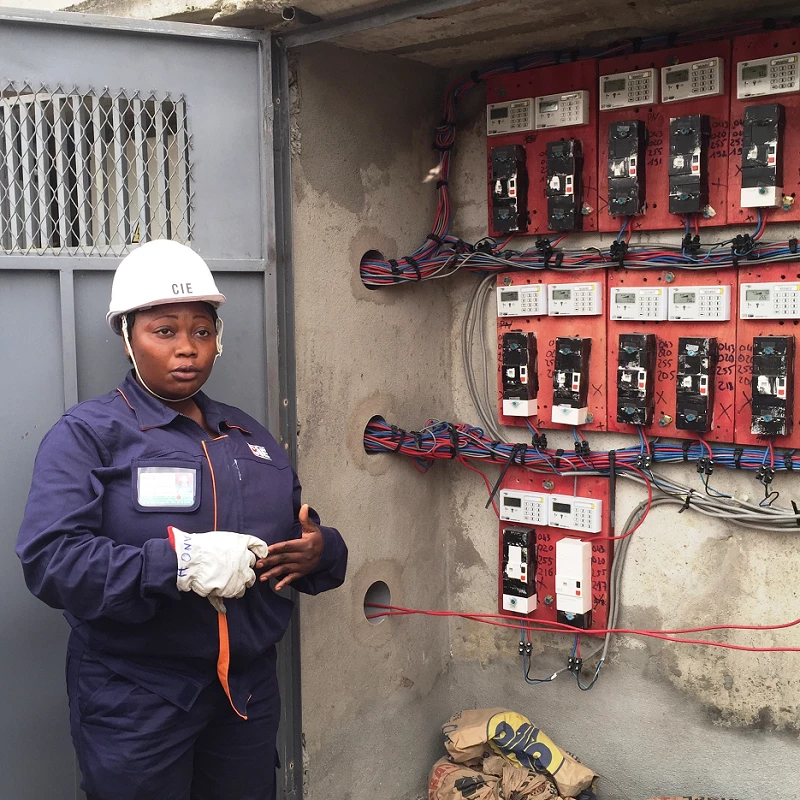
"I am happy with my new electricity connection—I pay less to the utility now than what I paid someone who sold me power before," said a woman I met recently in Anono, a low-income neighborhood of Cote d’Ivoire’s capital, Abidjan.
She proudly waved her new customer card at the utility worker. “My neighbor recharges his prepaid meter less often than I do,” she said. “I want as much power as he gets. I do not have many appliances, so give me a low-ampere connection like he has.”
Her neighbors echoed her sentiment.
I was impressed by how savvy first-time utility customers are about the tradeoff between the quality of service and cost of electricity access. Our visit to Anono followed a recent evaluation of World Bank Group Support to Electricity Access from 2000 to 2014. The report shows that over those 14 years, only 14 million grid and off-grid connections were delivered, while the Bank Group financed an estimated 60.2 gigawatts of generation capacity over the same period.
The report was a wake-up call and led us to think—how do we ensure that our large investment program in generation, transmission and distribution actually translates into electricity access for more Africans? Yes, off-grid solutions, such as those implemented through our successful Lighting Africa Program, work. But we also have to invest in the last mile, or even the last few yards of the electricity supply chain, to connect people to the grid. In many countries in Africa, the "entry ticket" is what holds the poor from getting a legal connection to grid power.
But it can be done. Take Cote d'Ivoire, for example. It has an extensive national grid, which means most people live relatively close to an electricity line. At the same time, many households do not have access to energy, or buy electricity illegally to avoid paying a hefty amount upfront for a legal connection. In the past few years, an IDA project has supported CIE, a privately owned operator in the country’s power sector, to carry out a pilot campaign for "social" connections, which essentially subsidized first-time connection charges. That meant households only had to pay $40 to connect to the grid and paid the remaining cost with their bi-monthly bills cost over time. By doing that, the program eliminated the biggest obstacle these families face to get connected to the grid—an exorbitant first-time payment.
The pilot campaign connected 45,000 new households to the grid in less than two years. But to reach even more people, the utility needed to step up. The pilot offered useful lessons to roll out social connections at a massive scale.
Cote d’Ivoire’s bold new Electricité pour tous ( Electricity for All) program takes into account lessons from the IDA pilot campaign. It offers households a connection for only $2 upfront and gives them the option of paying back the remainder over a period up to 10 years. The utility also pre-finances in-house wiring to increase affordability for the poorest. CIE has recruited and trained new staff for the access program, grouped into 25 dedicated crews that have customized trucks and equipment required to install new connections efficiently. Electricians have been trained and certified to follow the standards required for electrical wiring in homes. In the meantime, the government has also taken policy measures to address problems encountered in the pilot campaign. For instance, an opaque legal requirement for inspection of in-house wiring by a licensed inspector before the utility is allowed to connect a household has been eliminated.
The crew leader who showed us around in Anono—a dapper lady in her thirties with her safety helmet resting on her spiky dyed hair—told us how she and her crew have connected over 10,000 households in three Abidjan neighborhoods since the program was launched in September. That’s a third of the 30,000 connections installed country wide in the past three months.
Our team was struck by the potential to scale up the pilot program and help six million people in the country get legal access to electricity for the first time. That’s 25 percent of the country’s population. What better reason to find ways to implement this pilot on a larger scale and ensure sustainable energy for all in Cote d’Ivoire?


Join the Conversation